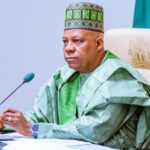The program associate for an advocacy organisation, Enough is Enough Nigeria (EiE), Itaita Perewari has emphasised on the need for Nigerians to leverage on technological devices to drive advocacy for accountability and better governance.
In an interview with Daily Trust, Perewari who serves as the project manager for the 2024 Technology, New Media, Citizens and Governance conference themed: “The Present and Future of Political Action in Africa” shared insight on the birth and goal of the conference.
What gave birth to the Technology, New Media, Citizens and Governance project?
So, basically the Technology, New Media, Citizens and Governance, (TNCG) used to be New Media and Governance, (NMG) which began in 2012 and powered by Enough is Enough Nigeria.
- Guardiola ‘didn’t intend to make light of self-harm’
- Robbers kill colleagues in gun duel with police
It started in partnership with the Shehu Musa Yar’adua Foundation and was hosted alongside PIN, Paradigm Initiative and Budget Foundation. So, over the years, we built on that success and held the second edition in 2016. It was when it changed to New Media, Citizens and Governance.
Because like I rightly said before, it started off as the New Media and Governance Conference, (NMGC). So, the reason why we had to make that shift from just the New Media and Governance Conference to New Media, Citizens and Governance was that we were aware of the fact that citizens were in the middle of New Media and Governance. That is, citizens started using new media tools like Facebook, Twitter, Instagram and just recently TikTok to demand for accountability.
So, that’s why we changed to NMCG, which is the New Media, Citizens and Governance Conference. So, over the years, we have done in 2012, 2016, 2018 and 2020. And the last one was in 2022.
So, this is the sixth edition. And this sixth edition, we now made a shift in changing the name again to now include technology.
Why was technology included in this edition?
Before it used to be just New Media, but we felt technology was all-encompassing, it is evident both in the conventional and new media. Now we have TikTok and AI, the Internet of Things. And within our space, when we go to conferences, we find out that there is a whole lot of buzz around AI, Artificial Intelligence.
And most importantly, recently, we discovered that in protest movements, that there has been a very high application of Artificial Intelligence. Recently in Kenya, there was a protest that was financed by technology.
So, we felt like technology is really taking the center stage when it comes to engagement, when it comes to governance. So, that was when we came up with a thing called technology, the present and future political action in Africa.
This was how this conference was set up and the whole program was designed to bring people from both sides of the divide, because in our field, we talk of the demand side and the supply side.
So, it’s not the economy or the way economists see it, but the way political scientists and also people in the civic spaces see that, that citizens demand accountability.
We discovered that in the space of the Civil Society Organisation (CSO), there has been a whole lot of civic tech tools that are simplifying governance, that is simplifying people being able to demand accountability. But, on the flip side, on the supply side, because when you make demand, you expect a supply. So, there is this shortage of supply. Demand for goods, demand for water and everything, light and everything.
Now, when you now put it in the context of even the application of technology, we find that there’s a lacuna, there is a space.
In recent times, we have had some states that are now being more open to using technology to bring about transparency and accountability because of the demand. So, we have now structured this conference into the demand and the supply side, and this is what runs through almost all our panel sessions and breakout sessions.
Does this mean technology will replace human activity in the future in the drive for good governance “?
So, now, protest should not be something that is going to bring about a total collapse of the system but it is a tool for civil disobedience, and civil disobedience is something that is very pivotal to democracy.
So, if technology is used ethically, basically, within a democratic space, where the principles of natural justice, rule of law are abided by, then it will go a long way. It can also help sanitize the system, especially when people are now more informed, because power belongs to the people, but the people need to take it.
How can cybercrime be prevented in the drive to use technology to foster better governance?
So, this question is a working question. Working question in the sense that it is actually part of some of the communique that we are expecting to have in this event. I would start by trying to clarify a particular phrase in our theme, which is political action. Because we said technology, the present and the future of political action. So, now, we need to really contextualize political action.
And in contextualizing political action, we will be able to now know that political action constitutes actions that are designed to attain a purpose by using political power or any activity within political channels including advocacy, demanding for something, voting, policy making and protests. And they are carried out by citizens, civil society groups, government agencies and political parties.
So, that is why this conference was organized to be able to bring the two sides of the divide. So, that is where things like regulation, because for me, I feel like there are certain grey areas when it comes to regulation. Because in a trust deficit environment, where there is a deficit of trust, where the citizens do not trust the government or the political class, there is every tendency to see whatever form of regulation as a means to stifle.
We have seen the gagging of the media.
We have also seen gagging of new media, Twitter ban. Yes, there was a Twitter ban during former president Mohammed Buhari’s tenure.
So, the truth is, new media and these technologies, AI and the rest of them, have their advantages and we are also aware that they have their disadvantages. That is why a major foundation of our program is to bring both sides together to see what they are doing with technology, how they are positively using technology, and how to mitigate some of these grey areas. So, I might not be the right resource person.
That’s why we have gotten speakers from across Africa, experts in the civic space, private sector people, the civic tech people, and also academia, and government people also because we are also going to be looking at, because the governance process also cuts into electioneering.
How will this conference impact the citizens?
I like the fact that you have personalized it, so, at Enough is Enough Nigeria, we believe in the office of the citizen. And we believe that the office of the citizen is the highest office in the land.
Now, the office of the citizen, it is a concept that, when you look at it, looks vague. It looks like something that you can’t relate to but it is something that actually exists because, as a citizen, you have an office that you have to run. Running your office means that you have power. Power belongs to the people. It is not just a cliche, It’s something that actually exists. So, this conference aims to benefit a Nigerian by, number one, getting them to understand how they can leverage technology for advocacy.
It also helps them to get to know the various tools they could use for this advocacy and how to be more participative in the political process.

 Join Daily Trust WhatsApp Community For Quick Access To News and Happenings Around You.
Join Daily Trust WhatsApp Community For Quick Access To News and Happenings Around You.


